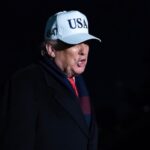

AT via Magic Studio
Years of accommodation and so-called mutually beneficial bilateral agreements have all enabled the rise of China.News stories of a China increasingly belligerent both at home and abroad are widespread. But in an attempt to understand how we have gotten into this position, many have assessed the growth of Beijing without fully examining the policies of previous U.S. presidential administrations.
Years of accommodation and so-called mutually beneficial bilateral agreements have all enabled the rise of China. Such is the dangerous legacy of the strikingly identical China policies under the Clinton, Bush, and Obama administrations that have left us with the short end of the stick and have made the international stage less stable, while presenting novel risks to the homeland.
In the 1990s, the Clinton administration’s democratization project firmly held the belief that free trade with and the integration of China into the World Trade Organization (WTO) would bring about change inside the East Asian country, ushering in a period of democracy and international compliance. During this time, the Clinton administration resisted criticisms of the China-U.S. Relations Act of China of 2000, which granted the China a place in the WTO.
Consequently, this trade deal lifted trade restrictions on China by granting it permanent normal trade relations, causing a sharp decrease in U.S. manufacturing jobs and putting American workers at a disadvantage. This outsourcing of jobs only increased rapidly thereafter and has contributed to the $1 trillion in trade surplus that China enjoys today.
All of this was done despite many warning signs of China’s capabilities — crackdowns on Uyghurs; the persecution of Falun Gong practitioners; and the CCP’s intimidation of Taiwan days before its election by firing missiles across the northern portion of the island. Not to mention China’s relentless covert operations and military/intellectual theft in the years prior.
The Bush administration followed suit, pursuing a policy of engagement even further. Following the 9/11 attacks, President Bush shifted his focus away from China and East Asia, refocusing on the Middle East and his regime-change ambitions, which proved to be unsuccessful and caustic. Meanwhile, the administration refused to label China a currency manipulator, formally issued the proclamation to grant China permanent normal trade status, and sat by as Confucius Institutes began to take root at U.S. universities (finally addressed by the first Trump administration).
Bush also announced a counter-terrorism partnership with China, which legitimized the Chinese Communist Party’s violence against the Uyghur population on baseless claims of mass radicalization at the hands of the East Turkestan Islamic Movement — a group whose exact coherence and capabilities have always been questioned, something that the first Trump administration acknowledged as well. This allowed the CCP to ramp up violence against this group, culminating in the ongoing genocide — a designation rightly put in place by the first Trump administration.
The Bush administration even went as far as to allow Chinese authorities fairly open access to certain prisoners at Guantanamo Bay for a period of seven to 10 days and permitted Chinese intelligence officials to use U.S. military personnel in order to extract information.
<img alt captext="AT via Magic Studio” class=”post-image-right” src=”https://conservativenewsbriefing.com/wp-content/uploads/2025/01/learning-from-years-of-accomodating-china.jpg” width=”450″>The Obama administration likewise refused to label China a currency manipulator and impose tariffs, and neglected to address the ever-growing U.S.-China trade imbalance. In fact, his administration signed some of the most genorous bilateral agreements with China, including an environmental agreement that imposed carbon emission regulations on U.S. — thereby hurting the energy sector — while placing nonbinding requirements on Chinese carbon emissions.
Similarly, in 2015, Obama and Xi Jinping entered into an agreement on the issue of conducting cyberattacks. Rather than placing sanctions and other restrictions on China, this agreement proved to be useless, as it was legally nonbinding and partially turned the blame on the U.S. — with Chinese cybertactics only continuing to evolve. This comes in addition to Obama’s other irresponsible decisions, like inviting the People’s Liberation Army Navy to participate in maritime warfare exercises.
The last four years of the Biden administration have further put us at a disadvantage, from breaches of military bases and the inflow of Chinese-subsidized fentanyl to the CCP’s appropriation of U.S. farmland, transnational repression carried out by United Front, the presence of sleeper cells that jeopardize our critical infrastructures, and increased exercises around Taiwan — all in light of the Bidens’ dealings with Chinese officials.
These policies of accommodation and incompetence only enabled China to grow stronger and more assertive over the years, posing a direct danger to the U.S. In studying this timeline, it is important not to repeat the mistakes of the past.
As the second Trump administration takes power, we can be confident that a policy of containment and accountability will be adopted based on the foreign policy record of the first term as well as the positions of many well-qualified appointees. President Trump and those around him recognize the threat the CCP poses, from the economic aspect to the military and social-political dimensions, affecting our homeland, our immediate region (characterized by concerns over Greenland and the Panama Canal Zone), and beyond.
There is, however, also room to ramp up our pressure. For example, the Trump administration may consider not only reestablishing its China Initiative — which Biden recklessly scrapped on grounds of identity politics — but also extending it to apply to all instances of espionage and transnational repression, not just those cases related to economic and intellectual theft.
The incoming administration may also benefit from listening to the stories and voices of notable anti-CCP advocates and figure, especially those who have experienced the regime firsthand. These individuals could perhaps provide valuable insight into how the Chinese regime thinks and operates — and any additional risks it may pose.
Make no mistake, an America First foreign policy includes a China Last strategy — one where the U.S. addresses all of its concerns regarding the Chinese Communist Party. Anyone who tells you otherwise has not learned their lesson from history.
Image: AT via Magic Studio





